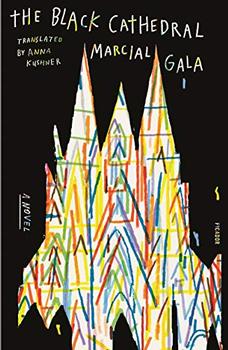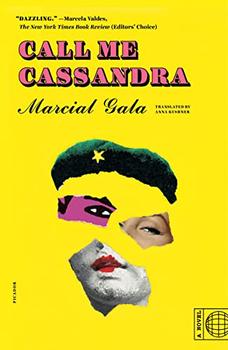Summary | Excerpt | Reviews | Beyond the book | Read-Alikes | Genres & Themes | Author Bio

Critics' Opinion:
Readers' Opinion:
First Published:
Jan 2020, 224 pages
Paperback:
Jan 2021, 224 pages
 Book Reviewed by:
Book Reviewed by:
Elisabeth Cook
Buy This Book
Marcial Gala's The Black Cathedral, translated from the Spanish by Anna Kushner, is narrated through many first-person accounts of people living in or otherwise connected to Punta Gotica, an impoverished neighborhood in the Cuban city of Cienfuegos. These accounts—at times contradictory, at times likely embellished—are all tied to the building of a cathedral for the Church of the Holy Sacrament, a branch of Christianity brought to the neighborhood by newcomer Arturo Stuart. As the story proceeds, the construction of the cathedral takes on a life of its own, growing larger than initially intended and igniting wild dreams and ambitions in those involved in its planning. Rogelio Roca Cueva, the architect for the project, describes the scope of his intentions:
"Ornament is crime," a great architect said, and that was my premise, I wanted the building to be perfect in its almost necessary simplicity, I wanted all of its complexity to come from the harmony and the quality of the materials used, I wanted to bring a piece of modernity to a sleepy Cuban town, I wanted that filthy neighborhood of Punta Gotica to have at least one thing to show the world, and I made an effort to achieve this.
The arrival of Arturo, his wife Carmen and their three children—David King, Prince and Johannes—is recounted in the opening pages of the book by several Punta Gotica inhabitants. The Stuarts are Black, and they stand out in the neighborhood because of their race coupled with their financial ease and sophistication—the narrators, many of whom are Black themselves, are frank in their mentions of race and its socio-economic realities throughout the book. We as readers aren't given much of a glimpse of the Stuarts' inner world, and consequently, there's a lot about them that we never know. But we are given the opportunity to see the impact they have on the local people, and to feel the ripples they send through the community over a number of years.
Their presence has an immediate effect. Shortly after they move in, a kid named Barbarito who insists (according to one account) that Prince is "queerer than a three-dollar bill," begins to harass the younger Stuart brother. In response, Prince casually strikes Barbarito on the head with a book, wounding him severely enough to send his mother knocking on the Stuarts' door. Meanwhile, David King, a physically imposing boy at 13 who is thought to be "kind of slow," disconcerts others with his ability to recite trivia. We see a more extreme example of the family's influence via Ricardo Mora Gutiérrez, a.k.a. Gringo, who falls in love with the artistically inclined Johannes—the oldest of the Stuart siblings—and subsequently starts killing people and selling human meat as "veal," supposedly in an attempt to gain enough money to impress her. After Johannes rejects him, Gringo goes to the U.S., where he continues his life of crime and eventually ends up on death row.
Gala's particular sense of wicked but gentle humor depends somewhat on crass language and an excess of violent and abusive behavior. But it also depends on the interview style of the novel, which softens the harshness of events through layers of time and subjectivity. Much of the book is implied to take place in the 1990s, a period of economic reform in Cuba that saw the introduction of free-market elements alongside socialism, and much of its characters' comic haplessness seems to spring from an unmoored sense of personal and financial possibility. But lest American readers believe The Black Cathedral only has barbs to aim at Cuban society, Gringo's escapades spotlight many absurdities of U.S. social reality, including the American tendency to commodify pain and trauma. A journalist who visits Gringo in jail asks to interview him for a book, insisting that he can make money and elicit sympathy from Americans if he exposes his difficult childhood. When Gringo refuses, the journalist, without missing a beat, mentions that his magazine would pay Gringo to pose nude.
In addition to the book's format, supernatural occurrences serve to balance the story's sharper subject matter. One of Gringo's victims appears as a ghost to a teenage girl in Punta Gotica named Berta, once enamored of Prince Stuart. The ghost implores Berta to track down his lover, Araceli, and to convince her to leave her husband. Berta fulfills his wishes, but winds up falling in love with Araceli herself.
All the novel's intertwined dramas are leading up to a tragedy, but this tragedy is hinted at so frequently and preceded by so much cruelty and misfortune that it's hard to see it as surprising or significant. And maybe this is part of the point: Gala's novel isn't based around a single event, but rather the continual horror and occasional beauty of people reacting to one another and their own feelings, setting the courses of their lives according to rhythms that exist outside of them—those of money, love and power.
To some readers, the book might not seem quite complete, but its measured restraint and the negative space at its center may be part of its draw for many others. We may only see the Stuart family and the cathedral from a distance, but they provide a structure for exploring the inner workings of the people around them in multiple intriguing ways. The Black Cathedral is an effervescent read filled with energy, possibility and chaotic delights.
![]() This review was originally published in The BookBrowse Review in February 2020, and has been updated for the
January 2021 edition.
Click here to go to this issue.
This review was originally published in The BookBrowse Review in February 2020, and has been updated for the
January 2021 edition.
Click here to go to this issue.

If you liked The Black Cathedral, try these:

by Raul Palma
Published 2023
A genre-bending debut with a fiercely political heart, A Haunting in Hialeah Gardens explores the weight of the devil's bargain, following the lengths one man will go to for the promise of freedom.

by Marcial Gala
Published 2023
From Marcial Gala, the author of the award-winning The Black Cathedral, Call Me Cassandra is a darkly magical tale of a haunted young dreamer, born in the wrong body and time, who believes himself to be a doomed prophetess from ancient Greek mythology.





The Flower Sisters
by Michelle Collins Anderson
From the new Fannie Flagg of the Ozarks, a richly-woven story of family, forgiveness, and reinvention.

The House on Biscayne Bay
by Chanel Cleeton
As death stalks a gothic mansion in Miami, the lives of two women intertwine as the past and present collide.

The Funeral Cryer by Wenyan Lu
Debut novelist Wenyan Lu brings us this witty yet profound story about one woman's midlife reawakening in contemporary rural China.
Your guide toexceptional books
BookBrowse seeks out and recommends the best in contemporary fiction and nonfiction—books that not only engage and entertain but also deepen our understanding of ourselves and the world around us.